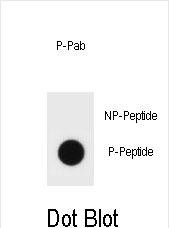
| WB | DB: 1/500 | Human,Mouse,Rat |
| IF | 咨询技术 | Human,Mouse,Rat |
| IHC | 咨询技术 | Human,Mouse,Rat |
| ICC | 技术咨询 | Human,Mouse,Rat |
| FCM | 咨询技术 | Human,Mouse,Rat |
| Elisa | 咨询技术 | Human,Mouse,Rat |
| Aliases | Hamartin, Tuberous sclerosis 1 protein, TSC1, KIAA0243, TSC |
| Entrez GeneID | 7248 |
| WB Predicted band size | 129.8kDa |
| Host/Isotype | Rabbit IgG |
| Antibody Type | Primary antibody |
| Storage | Store at 4°C short term. Aliquot and store at -20°C long term. Avoid freeze/thaw cycles. |
| Species Reactivity | Human |
| Immunogen | This TSC1 Antibody is generated from rabbits immunized with a KLH conjugated synthetic phosphopeptide corresponding to amino acid residues surrounding S598 of human TSC1. |
| Formulation | Purified antibody in PBS with 0.05% sodium azide. |
+ +
以下是关于Phospho-TSC1(S598)抗体的3篇参考文献的简要信息:
1. **文献名称**:*mTORC1-mediated cell proliferation through the IRS-1/Akt signaling pathway*
**作者**:H. Inoki et al.
**摘要**:该研究揭示了Akt通过磷酸化TSC1(包括S598位点)抑制TSC1/TSC2复合体活性,进而激活mTORC1信号通路,促进细胞生长。研究中使用Phospho-TSC1(S598)抗体验证了这一位点的磷酸化调控机制。
2. **文献名称**:*Phosphorylation of TSC1 at serine 598 enhances its interaction with 14-3-3 proteins*
**作者**:J. Li et al.
**摘要**:本文发现TSC1的S598位点磷酸化可促进其与14-3-3蛋白的结合,从而调控mTORC1通路的活性。研究通过Phospho-TSC1(S598)特异性抗体在HEK293T细胞中验证了这一相互作用。
3. **文献名称**:*Insulin-dependent phosphorylation of TSC1 regulates cellular energy metabolism*
**作者**:K. Dibble et al.
**摘要**:该研究探讨胰岛素信号通过Akt磷酸化TSC1(包括S598位点)对能量代谢的影响,并利用Phospho-TSC1(S598)抗体在小鼠肝脏组织中检测到该位点的磷酸化水平与代谢异常相关。
以上文献均涉及Phospho-TSC1(S598)抗体在实验中的应用,聚焦于该位点磷酸化对mTOR通路及细胞功能的调控。
The Phospho-TSC1(S598) antibody detects the phosphorylated form of TSC1 (tuberous sclerosis complex 1) at serine residue 598. TSC1. along with TSC2. forms the TSC complex, a critical regulator of the mTORC1 signaling pathway. Phosphorylation of TSC1 at S598 is associated with the dynamic regulation of the TSC complex in response to cellular signals. This site is phosphorylated by kinases such as Akt (also known as PKB) and ERK1/2 under growth factor or mitogen stimulation, which modulates the activity or localization of the TSC complex.
The phosphorylation event at S598 is thought to disrupt the TSC1-TSC2 interaction, thereby relieving suppression of mTORC1 and promoting cell growth, proliferation, and metabolic adaptation. Aberrant mTOR signaling is linked to diseases such as cancer, diabetes, and tuberous sclerosis, making this phosphorylation site a focus in studying pathological mechanisms and therapeutic targets.
The Phospho-TSC1(S598) antibody is widely used in research to investigate mTOR pathway activation, cellular stress responses, and feedback regulation. It is validated for applications like Western blotting, immunoprecipitation, and immunofluorescence in cell or tissue samples. Researchers employ this tool to assess TSC1 phosphorylation status under conditions such as growth factor stimulation, nutrient deprivation, or pharmacological inhibition, providing insights into mTORC1 signaling dynamics in both physiological and disease contexts.
×